How Was WhatsApp Created?
WhatsApp is not just one of the world’s most popular and successful messaging apps. It is also a very inspiring rags to riches story with some very humble beginnings.
The app’s beginning can be traced to January 2009, when a former Yahoo engineer named Jan Koum bought his first iPhone and started playing around with the App Store, Forbes reported. As he looked at the iPhone, Koum realized that apps would become a major new industry and a revenue generator.
 The men behind WhatsApp, Jan Koum & Brian Acton, courtesy Forbes
The men behind WhatsApp, Jan Koum & Brian Acton, courtesy Forbes
Koum eventually started discussing an idea for an app over tea with his friend Alex Fishman in the kitchen in West San Jose, California. The idea Koum had for a new app was a very simple one—an address book that would show a person’s status to the members of his or her social media network.
Koum then spent several weeks creating the backend code for the App and named it WhatsApp, a phrase that sounds similar to a popular American slang term—What’s up. Interestingly enough, the first action Koum took with the app was to create a company called WhatsApp Inc. and incorporate it.
Started in a Restaurant
Over the next few weeks Koum began improving and testing WhatsApp by letting his friends use it. As he worked on the project, Koum realized that he was creating more than an address book; he was building an instant messaging service. In February 2009 Koum released WhatsApp 2.0, the world’s second free texting service on the App Store, and soon had 250,000 users.
To help him build WhatsApp, Koum enlisted the aid of his old friend and former boss, Brian Acton. The two started hanging out at the Red Rock Café, a popular restaurant in Mountain View, California, and working on WhatsApp. With $250,000 they borrowed from friends, the two started hiring employees. They leased space in an old warehouse and started updating their creation.
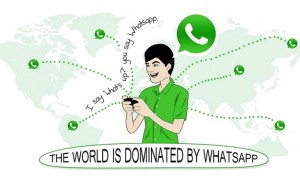 WhatsApp was unique and popular because it was the first service that offered free international messaging. It also used a person’s phone number as a login, which made it very easy to use, unlike some other products on the market in those days.
WhatsApp was unique and popular because it was the first service that offered free international messaging. It also used a person’s phone number as a login, which made it very easy to use, unlike some other products on the market in those days.
In December 2009 they had their first hit with a version of WhatsApp that could send photos that they began selling through the iPhone for $1. By 2011 they had one of the top 20 apps in the U.S. App Store, and by 2013 WhatsApp had 200 million users worldwide.
From Food Stamps to Facebook
WhatsApp hit the big time in February 2014 when it was announced that Koum and Acton were selling the company to Facebook for $19 billion in cash and stock. By then, WhatsApp had 450,000 users all over the world.
When they signed the Facebook deal, Koum insisted on holding the ceremony outside an abandoned social services office near WhatsApp headquarters. It was the same building where the Koum and his mother had once stood in line to receive food stamps, welfare payments for families too poor to buy food.
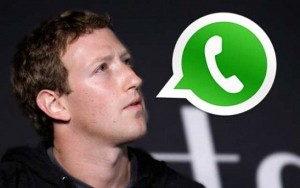 Koum had come full circle from his childhood in a village outside Kiev, Ukraine, that had no electricity.
Koum had come full circle from his childhood in a village outside Kiev, Ukraine, that had no electricity.
Koum moved to the United States when he was 16 and swept floors at a grocery store to help pay the bills. By the time he was 18, Koum had taught himself computer networking by reading manuals he bought from a used book store.
He met Brian Acton while working as an infrastructure engineer at Yahoo. The coworkers became friends and shared many traits, including a hatred of advertising, which was ironic because the two helped develop Yahoo’s advertising platform in 2006.
The Facebook deal brought the two full circle in another way because in 2009 both had been turned down for jobs at the social network. Koum had also been rejected for a position at the world’s most famous texting service, Twitter. Instead, they made WhatsApp into a company and paid the bills by selling apps on Facebook.
It Did Not Make Money
The most fascinating aspect of the WhatsApp story is that the company did not make a lot of money until quite recently. When Facebook bought the service in 2014, it was generating tens of millions of dollars in revenue from app sales, according to Business Insider, which is nothing for a Silicon Valley company.
Koum and Acton could have made far more money if they had simply added advertisements to their app, but they hated advertising. They also rejected outside investment and went out of their way to keep costs low. Forbes reported that the company’s first office was in a building so cold the founders had to cover themselves with blankets.
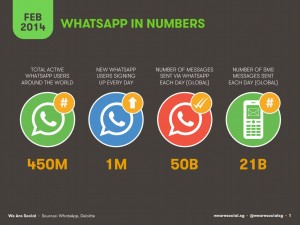 WhatsApp saved money by having all its development done in Russia, where labor costs for web design and app creation are far lower. In 2014, at the time of its acquisition by Facebook, WhatsApp only employed 50 people. By then the company was extremely profitable because of the advent of Google Android.
WhatsApp saved money by having all its development done in Russia, where labor costs for web design and app creation are far lower. In 2014, at the time of its acquisition by Facebook, WhatsApp only employed 50 people. By then the company was extremely profitable because of the advent of Google Android.
Interestingly enough, many Silicon Valley insiders had predicted that WhatsApp would fail because it did not take any advertising. The experts were skeptical about the potential of an app-based company.
Acton and Koum’s success proved them wrong; Forbes estimated that each of them took home around $6.8 billion after the Facebook deal. It is not clear what they will do next, but we probably have not heard the last of the two men behind WhatsApp.
Although, Time reported that Koum wants to make WhatsApp faster and more stable with the Facebook money. News stories indicate that WhatsApp will continue to be ad free and that Koum will focus on growing the company rather than monetizing it.
Interestingly, Koum and Facebook’s founder and CEO Mark Zuckerberg have been friends for many years. Zuckerberg was so impressed with WhatsApp that he spent two years trying to buy the company, often raising the possibility with Koum when the two went walking and hiking together.
Despite its humble origins, WhatsApp has proven that something very simple can change the world. The success of WhatsApp proves that apps are big business and that they are here to stay.
 Yes, it’s not just a rumour, it’s true. The release of Windows 10 was much expected, and now that it is available users will be glad to know that it will support WhatsApp Web too. Microsoft has confirmed that they are updating Edge, the new Windows 10 browser, so that it can soon support also WhatsApp Web.
Yes, it’s not just a rumour, it’s true. The release of Windows 10 was much expected, and now that it is available users will be glad to know that it will support WhatsApp Web too. Microsoft has confirmed that they are updating Edge, the new Windows 10 browser, so that it can soon support also WhatsApp Web.
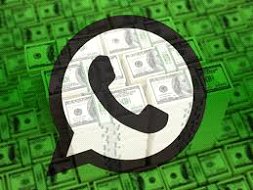 To make matters worse, the social messaging service famously refuses to tap one of the most popular and lucrative streams of cash online, namely advertising. WhatsApp founders Brian Acton and Jan Koum famously hate advertising and even wrote blog posts attacking the practice.
To make matters worse, the social messaging service famously refuses to tap one of the most popular and lucrative streams of cash online, namely advertising. WhatsApp founders Brian Acton and Jan Koum famously hate advertising and even wrote blog posts attacking the practice. To make even more money, WhatsApp was adding around one million users a day, which adds up to around $1 million a day in revenue.
To make even more money, WhatsApp was adding around one million users a day, which adds up to around $1 million a day in revenue.
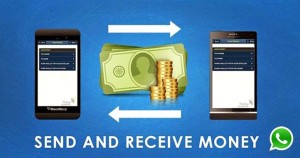
 Can you imagine your life without Whatsapp, Facebook Messenger or whatever other instant messaging app? Well, it’s hard. Many of us are now completely addicted to those communication systems. But even if you are not such a big user, you might be interested to know that from today you have one more app available to communicate with your friends and family.
Can you imagine your life without Whatsapp, Facebook Messenger or whatever other instant messaging app? Well, it’s hard. Many of us are now completely addicted to those communication systems. But even if you are not such a big user, you might be interested to know that from today you have one more app available to communicate with your friends and family. Livetext is a messaging platform and it is halfway between Snapchat and WhatsApp. You can use Livetext, that is available now for Android and iOS devices, as a classical text chat with emoticons and video support, but without the ability to have the audio. So Livetext users are allowed to video text their messages. Yahoo! Livetext is now available on Google Play Store and App Store in the United States, Canada,France UK and Germany, while it was already available in Ireland, Taiwan and Hong Kong.
Livetext is a messaging platform and it is halfway between Snapchat and WhatsApp. You can use Livetext, that is available now for Android and iOS devices, as a classical text chat with emoticons and video support, but without the ability to have the audio. So Livetext users are allowed to video text their messages. Yahoo! Livetext is now available on Google Play Store and App Store in the United States, Canada,France UK and Germany, while it was already available in Ireland, Taiwan and Hong Kong. Are you thinking about sending a message through Viber or WhatsApp without touching your smartphone keyboard? Now it’s possible. Thanks to new updates introduced to Google Now (Google’s smartphone voice assistant), we are now allowed to send messages to our contacts through WhatsApp or other messaging applications like Viber, WeChat, NextPlus and Telegram simply dictating them.
Are you thinking about sending a message through Viber or WhatsApp without touching your smartphone keyboard? Now it’s possible. Thanks to new updates introduced to Google Now (Google’s smartphone voice assistant), we are now allowed to send messages to our contacts through WhatsApp or other messaging applications like Viber, WeChat, NextPlus and Telegram simply dictating them.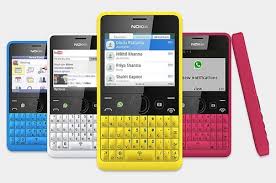 During the last few weeks WhatsApp has introduced
During the last few weeks WhatsApp has introduced  More
More  The men behind WhatsApp, Jan Koum & Brian Acton, courtesy Forbes
The men behind WhatsApp, Jan Koum & Brian Acton, courtesy Forbes WhatsApp was unique and popular because it was the first service that offered free international messaging. It also used a person’s phone number as a login, which made it very easy to use, unlike some other products on the market in those days.
WhatsApp was unique and popular because it was the first service that offered free international messaging. It also used a person’s phone number as a login, which made it very easy to use, unlike some other products on the market in those days. Koum had come full circle from his childhood in a village outside Kiev, Ukraine, that had no electricity.
Koum had come full circle from his childhood in a village outside Kiev, Ukraine, that had no electricity. WhatsApp saved money by having all its development done in Russia, where labor costs for web design and app creation are far lower. In 2014, at the time of its acquisition by Facebook, WhatsApp only employed 50 people. By then the company was extremely profitable because of the advent of Google Android.
WhatsApp saved money by having all its development done in Russia, where labor costs for web design and app creation are far lower. In 2014, at the time of its acquisition by Facebook, WhatsApp only employed 50 people. By then the company was extremely profitable because of the advent of Google Android.